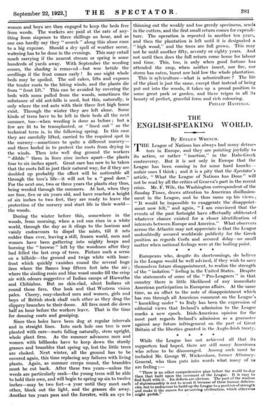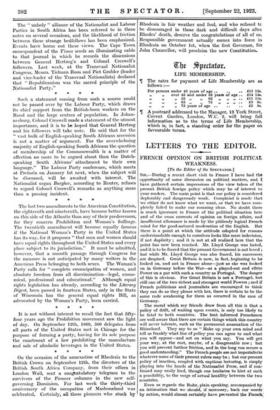THE
ENGLISH-SPEAKING WORLD.
By EVELYN WRENCH. THE League of Nations has always had many detrac- tors in Europe, and they are pointing joyfully to its action, or rather " inaction," in the Italo-Greek controversy. But it is not only in Europe that the League has been coming in for some hard knocks— unfair ones I think ; and it is a pity that the Spectator's article, "What the League of Nations has Done" will not be read by all the critics of Geneva's part in the recent crisis. Mr. F. Wile, the Washington correspondent of the Sunday Times, draws attention to American disillusion- ment in the League; and- he thus sums up his views : " It would be. impossible to exaggerate t.he disappoint- Ment now felt," and again, " I am convinced that the events of the past fortnight have effectually obliterated whatever chance existed for a closer identification of interests between Europe and America." What observers across the Atlantic may not appreciate is that the League undoubtedly secured worldwide publicity for the Greek position as regards Corfu and secured delay—no small matter when national feelings were at the boiling point.
Europeans who, despite its shortcomings, do believe in the League would be well advised, if they wish to save themselves future disappointment, to realize the strength of the " isolation " feeling in the United States. Despite the statements of some of the " Pro-Leaguers " in that country there is little likelihood of any immediate American participation in European affairs. At the same time, as an offset to the note of disappointment which has run through all American comment on the League's " knuckling under " to Italy has been the expression of editorial views that Ireland's admission to the League marks a new epoch. Irish-American opinion for the most part regards Ireland's admission as a guarantee against any future infringement on the part of Great Britain of the liberties granted in the Anglo-Irish treaty.
* * * * While the League has not achieved all that its supporters had hoped, there are still many Americans who refuse to be discouraged. Among such must be included Mr. George W. Wickersham, former Attorney- General, who thus puts into words what many of us are feeling :— " There is no other comprehensive plan before the world to-day than that built upon the covenant of the League. It is easy to find fault with it. Its defects are obvious. The part of the wisdom of statesmanship is not to scout it because of these human deficien- cies, but to endeavour to build up the League to a position of strength and make it the means for um:crying civilization, which otherwiso might -perish." The " unholy " alliance of the Nationalist and Labour Parties in South Africa has been referred to in these notes on several occasions, and the likelihood of friction between these strange bedfellows has been emphasized. Events have borne out these views. The Cape Town. correspondent of the Times sends an illuminating cable to that journal in which he records the dissensions between General Hertzog's and Colonel Creswell's followers. Last week, at the Transvaal Nationalist Congress, Messrs. Tielman Roos and Piet Grobler (leader and vice-leader of the Transvaal Nationalists) declared that " Republicanism was the sacred principle of the Nationalist Party."
* * Such a statement coming from such a source could not be passed over by the Labour Party, which draws its chief support from the British-born workers on the Rand and the large centres of population. In Johan- nesburg, Colonel Creswell made a statement of the utmost importance, and it is to be hoped that General Hertzog and his followers will take note. He said that for the " vast bulk of English-speaking South Africans secession is not a matter of argument. For the overwhelming majority of English-speaking South Africans the question of membership of the Commonwealth is a matter of affection no more to be argued. about than the Dutch- speaking South Africans' attachment to their own language." The Labour Party conference, which meets at Pretoria on. January 1st next, when the subject will be discussed, will be awaited with interest. The Nationalist organ Burgher, according to Reuter, refuses to regard Colonel Creswell's remarks as anything more than a passing incident.
* The last two amendments to the American Constitution, the eighteenth and nineteenth, have become better known on this side of the Atlantic than any of their predecessors, for they concern Prohibition and Woman's Suffrage. The twentieth amendment will become equally famous if the National Woman's Party in the United States has its way, for it proposes " that men and women should have equal rights throughout the United States and every place subject to its jurisdiction." It must be admitted, however, that a smooth passage through Congress for the measure is not anticipated by many writers in the American Press belonging to both sexes. The Woman's Party calls for " complete emancipation of women, and absolute freedom from all discrimination—legal, econo- mical, professional and educational." Although equal rights legislation has already, according to the Literary Digest, been passed in fourteen States, only in the State of Wisconsin has the general equal rights Bill, as advocated by the Woman's Party, been carried.
It is not without interest to recall the fact that fifty- four years ago the Prohibition movement saw the light of day. On September 12th, 1869, 500 delegates from all parts of the United States met in Chicago for the purpose of forming a party, having for its sole purpose the enactment of a law prohibiting the manufacture and sale of alcoholic beverages in the United States.
* * * * On the occasion of the annexation of Rhodesia to the British Crown on September 12th, the directors of the British South Africa Company, from their offices in London Wall, sent a congratulatory telegram to the survivors of the Pioneer columns in the new self- governing Dominion. For last week the thirty-third anniversary of the occupation of Mashonaland was celebrated. Certainly, all those pioneers who' stuck by Rhodesia in fair weather and foul, and wha refused to be discouraged in those dark and difficult days after Rhodes' death, deserve the congratulations of all of us. Responsible government actually comes into force in Rhodesia on October 1st, when the first Governor, Sir John Chancellor, will proclaim the new Constitution.







































 Previous page
Previous page